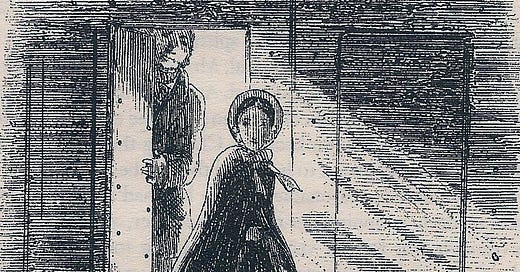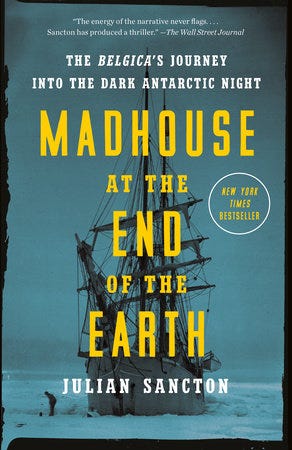April 2022
Little Dorrit, Charles Dickens
The Madhouse at the End of the Earth, Julian Sancton
The Narrative of Arthur Gordon Pym, Edgar Allen Poe
I imagine this will be an ongoing section here in The Machine Shop, a kind of running tally of the books that are collecting on my bedside table. I’m a little leery to make a precedent here, as my reading habit can be pretty swingy: I’ll demolish a book or two in a week — and then slog through some three hundred page paperback for a month. But maybe there’s something to be gained from being candid, laying it all out there. Interesting patterns might emerge, or distressing habits may reveal themselves. In any case, maybe you’ll get some ideas for your next trip to the bookstore — or go to the mat in the comments recommending some novel or other.
I’ve been slowly making my way through the Charles Dickens pile since like 2015, by listening to audiobooks of his work, as read by Simon Vance. Simon is an actor and audiobook narrator par excellence; my sister introduced me to his work when his readings of Patrick O’Brian’s Aubrey–Maturin novels were suddenly going out of print and she urged me (and everyone else she knows, I think) to buy them all immediately from the iTunes store. I’ve since met Simon backstage at one or another Decemberists show — he’s a super nice guy and a fan. I cannot tell you how many books he’s narrated but he is clearly very prolific (scratch that, it’s the top query when you google his name and he’s read more than eight hundred, good god). Most of the Dickens novels are available in his pleasant, versatile voice, and I would highly recommend them. There is, as you might know, a veritable constellation of characters in these books and Simon manages to make a distinct voice for each of them — not a small feat!
So here I am, currently some three quarters of the way through Little Dorrit, in fits and starts, but I am more or less in it. There’s something about listening to a book rather than reading one that lends itself to a more passive interaction: I listen to it mostly in the car, when I’m taking the kids to school or driving to some appointment. I drive out to Astoria, OR fairly often these days, and that two hours is typically given over to Mr. Vance’s dulcet tones, narrating the comings and goings of Arthur Clennam and the whole crew. Listening, you go with the flow, spinning adrift some times, other times bravely navigating the current. I very nearly called this newsletter/webpage/blog thing The Circumlocution Office, but was neatly walked back from that particular cliff by the more reasonable people in my life. I went on a small Kafka bender a few years ago and I am appreciating the proto-Kafka sensibilities here, in regards to that Office. Is Kafkaesque actually Dickensian? Or the other way around? It remains to be seen how Little Dorrit — which I very nearly abbreviated as Little D just now, which seems unwise and so I will refrain — it remains to be seen how Little Dorrit will stack up against my other Vance-Reads-Me-Dickens experiences, but I will append the existing list as it currently stands (ranked best to mehst):
Bleak House
Our Mutual Friend
A Tale of Two Cities
Great Expectations
Oliver Twist
David Copperfield
Hard Times
My sense, for those keeping track at home, is that L Dorrit — is that better? — will slot in somewhere around A Tale of Two Cities, which I realize I may rate higher than most, due to the fact that the ending brought me to tears. (Oh, I’m a sentimental sort.)
In the meantime, I’ve been keeping company with a bit of maritime nonfiction (as I am wont to do) — Julian Sancton’s super gripping Madhouse at the End of the Earth, which is about the 1890s misadventures of the brig Belgica as she traverses uncharted territory in and around Antarctica. I don’t believe I’ve gotten to the meat of the misadventures yet — they’ve just got stuck in the ice — but wow is this a star-crossed voyage so far. Sancton is a great writer and has a real knack for turning relatively staid events into lovely, poetical turns. It sometimes rankles when a nonfiction writer gets a bit liberal with interior thought of people in the story — say, a sea captain gazing out at the Southern Cross — it clearly moves beyond just the facts. When done clumsily, it can be like those terrible re-enactments you see in historical documentaries (ugh can you just please show some grainy black and white photos instead please), but Sancton manages it in such a way that — so far — I’ve not been taken out of the spell.
In that book, Sancton makes mention of Poe’s The Narrative of Arthur Gordon Pym of Nantucket as a story that would’ve been familiar to the sailors on the Belgica at the time, and I thought I’d follow that particular literary dérive; I downloaded (via libro.fm, of course) Poe’s 1838 novel and have been listening to it in between chapters of L.D. (there it is). What a ripper! Wikipedia tells me this is Poe’s only novel — it’s one I’d been aware of for a long time, but, for one reason or another, had not yet read. Granted access to a time machine, I might’ve slipped a copy of Pym into the dewy hands of my 25-year-old self and insisted he read it — those were the heights of my fascination for maritime adventuring (see also: just about every song on those first three Decemberists records) and I imagine I would’ve really made hay with it. As it happens, my 47-year-old self is deep in the grips of the book, so don’t be surprised if we start seeing the words foretopsail and mizzenmast find their way back into future songs like it was 2002 all over again.
Hard a-lee!
Colin











Amazing! Exactly the kind of content I was hoping to see here.
LOVE knowing what you're reading. I hope you'll keep us updated. I adore the esoteric language in Decemberists music, so I always knew you were a reader. The other day I saw the only other reference to Arabesque that I've ever seen outside The Island, and I laughed when I realized where I'd heard it before. Of course, from a Decemberists song :P "Affix your barb and bayonet, the curlews carve their Arabesques." How fucking great is that??